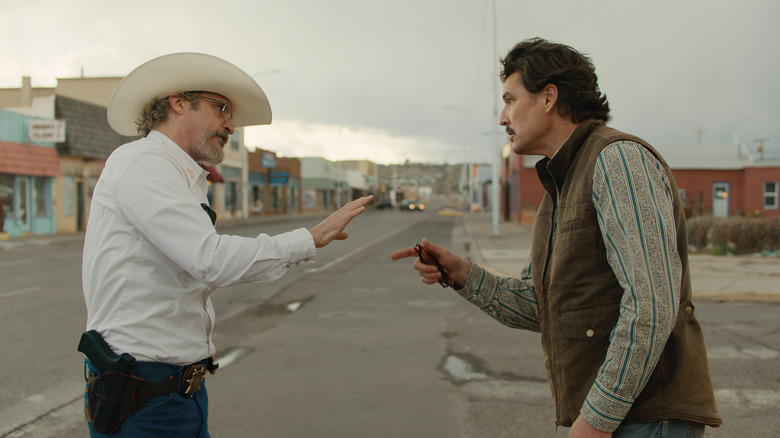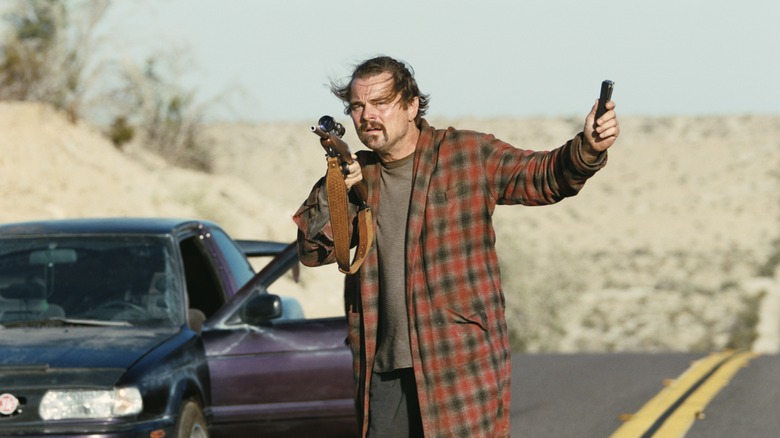Maintain on there, only a minute. This text comprises spoilers for “Eddington” and “One Battle After One other.”
In probably the most optimistic future I can think about, we glance again on the movies of 2025 with a form of grateful nostalgia — gratitude that the political pandemonium and cultural chaos portrayed did not final, and as an alternative turned window dressing for a really particular period of cinema. It is a stretch, I do know. For now, all now we have are two specific motion pictures that present the contradictions, grotesqueries, violence, and paranoia of the current second. I am speaking, in fact, about Paul Thomas Anderson’s “One Battle After One other” and Ari Aster’s “Eddington.”
Launched simply months aside and filmed towards related backdrops of the American southwest, these two movies differ fairly starkly if you simply take a look at the synopses. “Eddington” follows the small-town rivalry of a sheriff (Joaquin Phoenix) and mayor (Pedro Pascal) within the midst of the COVID-19 pandemic. There’s in depth commentary on huge tech, conspiracy concept tradition, and the ability of the Web to contaminate and isolate the mind. However, “One Battle After One other” is a basic Hollywood action-adventure movie, centered on a militant revolutionary group and the fallout of their actions towards the U.S. authorities and army — particularly, the rising army and police marketing campaign towards undocumented immigrants.
Each movies are deeply grounded within the present American political second, but it surely’s the best way during which they every discover the mania of it that second during which they actually mirror each other. Although Anderson’s directorial sentiments usually lean towards the creative Hollywood drama, and Aster’s towards the unsettling realm of horror, each discover an unintended middleground of their steadily absurd, completely overwhelming portrait of up to date American stress.
Thematic Throughlines between Eddington and One Battle After One other
Whereas each movies cowl totally different corners of the present American cultural panorama, so to talk, they’re topics that overlap extensively. In “Eddington,” the violence that breaks out on the streets of the titular New Mexico city is fueled by rising pandemic-era paranoia and isolation, however the true collapse of the characters into insanity and desperation is powered by unseen, tentacled forces behind the scenes. Sheriff Cross’s spouse, Louise (Emma Stone), is preyed upon by an Web-savvy spiritual cult of conspiracy worshippers, whereas her mom, stuffed away in the home, falls down the QAnon rabbit gap. These digital drivers of radicalization are set towards the city’s burgeoning knowledge middle undertaking — one which Mayor Garcia, for all his public espousing of progressive concepts, is being bribed to push by means of.
Protests additionally type the core set piece of “One Battle After One other,” when the grotesque Colonel Lockjaw (Sean Penn) launches a full-blown army assault on the sanctuary metropolis of Baktan Cross below the auspices of rooting out a supposed underground immigrant drug community. His actual motivation is discovering Willa Ferguson (Chase Infiniti), daughter of former French 75 revolutionaries Bob Ferguson (Leonardo DiCaprio) and Perfidia Beverly Hills (Teyana Taylor). A sexual encounter with Perfidia 16 years prior leads Lockjaw to suspect he is likely to be Willa’s organic father, which might throw a wrench in his software to the white supremacist doom cult referred to as the Christmas Adventurers Membership.
As soon as once more, the cabal lights the fuses that blow on the streets of Baktan Cross. Each movies present extra critical violence kicked off by outdoors agitators — brokers of Lockjaw within the case of “One Battle,” and extra shadowy militants in “Eddington,” although the movie suggests they might have been despatched by the funders of the city’s huge knowledge middle.
Grotesque chaos in fashionable America
Even with all of those narrative and thematic parallels, “One Battle After One other” and “Eddington” would not really feel so destined for double-feature remedy if not for the particular tone they take to their respective tales of political turmoil. Each Phoenix’s Sheriff Cross and Penn’s Col. Lockjaw — males of regulation enforcement, albeit of massively totally different scales — are painted in equal shades of pitiful, pitiable, incompetent, and deeply merciless. Each conduct brutal violence out of tension across the idea of manhood. And each finish their tales in grotesque ways in which make you wish to look away from the display screen, even if you happen to imagine they finally bought what they deserved.
His historical past of interracial relations revealed, Lockjaw is dealt a double loss of life by the cult he craves so desperately (to the purpose of tears, in his ultimate scenes) to be part of. When a shotgun blast to the cranium does not end him off, they end him with trickery and an impromptu gasoline chamber earlier than dumping him down a trash chute — aesthetic Nazism of the least refined selection. Cross additionally survives bullet wounds that look deadly at first, which leaves him the extraordinarily disabled figurehead mayor of a city absolutely bought to the identical huge tech pursuits that not directly drove it to insanity.
Anderson’s New Hollywood sensibilities present the one conventional “glad ending” in both movie, with Willa taking over her dad and mom’ revolutionary tendencies and carrying the torch for the subsequent era. However even with that constructive twinge within the ultimate moments, the movie stops far in need of offering a feel-good balm to the abject violence — specific and implicit — of the factor it calls America.



